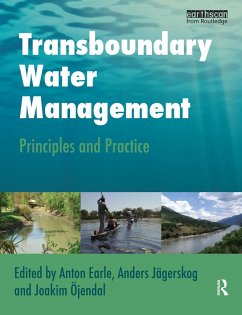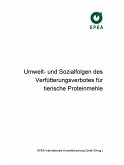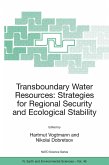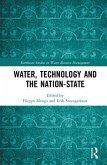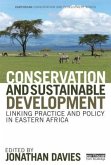Transboundary Water Management
Principles and Practice
Herausgeber: Earle, Anton; Öjendal, Joakim; Jägerskog, Anders
Transboundary Water Management
Principles and Practice
Herausgeber: Earle, Anton; Öjendal, Joakim; Jägerskog, Anders
- Broschiertes Buch
- Merkliste
- Auf die Merkliste
- Bewerten Bewerten
- Teilen
- Produkt teilen
- Produkterinnerung
- Produkterinnerung
First Published in 2010. Routledge is an imprint of Taylor & Francis, an informa company.
Andere Kunden interessierten sich auch für
![The Truth of Ecology The Truth of Ecology]() Dana PhillipsThe Truth of Ecology57,99 €
Dana PhillipsThe Truth of Ecology57,99 €![Umwelt- und Sozialfolgen des Verfütterungsverbotes für tierische Proteinmehle Umwelt- und Sozialfolgen des Verfütterungsverbotes für tierische Proteinmehle]() Umwelt- und Sozialfolgen des Verfütterungsverbotes für tierische Proteinmehle15,00 €
Umwelt- und Sozialfolgen des Verfütterungsverbotes für tierische Proteinmehle15,00 €![Water Diplomacy Water Diplomacy]() Shafiqul IslamWater Diplomacy186,99 €
Shafiqul IslamWater Diplomacy186,99 €![Transboundary Water Resources: Strategies for Regional Security and Ecological Stability Transboundary Water Resources: Strategies for Regional Security and Ecological Stability]() Hartmut Vogtmann / Nikolai Dobretsov (eds.)Transboundary Water Resources: Strategies for Regional Security and Ecological Stability186,99 €
Hartmut Vogtmann / Nikolai Dobretsov (eds.)Transboundary Water Resources: Strategies for Regional Security and Ecological Stability186,99 €![Illegal Logging Illegal Logging]() Luca TacconiIllegal Logging197,99 €
Luca TacconiIllegal Logging197,99 €![Water, Technology and the Nation-State Water, Technology and the Nation-State]() Water, Technology and the Nation-State197,99 €
Water, Technology and the Nation-State197,99 €![Conservation and Sustainable Development Conservation and Sustainable Development]() Conservation and Sustainable Development197,99 €
Conservation and Sustainable Development197,99 €-
-
-
First Published in 2010. Routledge is an imprint of Taylor & Francis, an informa company.
Hinweis: Dieser Artikel kann nur an eine deutsche Lieferadresse ausgeliefert werden.
Hinweis: Dieser Artikel kann nur an eine deutsche Lieferadresse ausgeliefert werden.
Produktdetails
- Produktdetails
- Verlag: Taylor & Francis
- Seitenzahl: 280
- Erscheinungstermin: 25. August 2010
- Englisch
- Abmessung: 244mm x 186mm x 23mm
- Gewicht: 767g
- ISBN-13: 9781849711388
- ISBN-10: 1849711380
- Artikelnr.: 29834285
- Herstellerkennzeichnung
- Libri GmbH
- Europaallee 1
- 36244 Bad Hersfeld
- gpsr@libri.de
- Verlag: Taylor & Francis
- Seitenzahl: 280
- Erscheinungstermin: 25. August 2010
- Englisch
- Abmessung: 244mm x 186mm x 23mm
- Gewicht: 767g
- ISBN-13: 9781849711388
- ISBN-10: 1849711380
- Artikelnr.: 29834285
- Herstellerkennzeichnung
- Libri GmbH
- Europaallee 1
- 36244 Bad Hersfeld
- gpsr@libri.de
Anton Earle is Project Director of Capacity Building, at the Stockholm International Water Institute (SIWI), Sweden Anders Jägerskog is Project Director, Applied Research, SIWI, and Associate Professor, School of Global Studies, Peace and Development Research, University of Gothenburg, Sweden Joakim Öjendal is Professor at the School of Global Studies, Peace and Development Research, University of Gothenburg, Sweden.
Foreword
Contributors
1. Introduction: Setting the Scene for Transboundary Water Management
Approaches
Part I: Analytical Approaches to Transboundary Water Management
2. Why Negotiate? Asymmetric endowments and asymmetric power and the
invisible nexus of water, trade and power that brings apparent water
security
3. Power, Hegemony and Critical Hydropolitics
4. Getting Beyond the Environment-Conflict Trap: Benefit-Sharing in
International River Basins
Part II: Transboundary Water Management Polity and Practice
5. International Water Law: concepts, evolution and development
6. Aquifer Resources in a Transboundary Context: A Hidden Resource? -
Enabling the Practitioner To 'See It & Bank It' for Good Use
7. Governance in Transboundary Basins - the Role of Stakeholders, Concepts
and Approaches in International River Basins
8. Environmental Flows in Shared Watercourses: Review of Assessment Methods
and Relevance in the Transboundary Setting
9. Managing Water Negotiations and Conflicts in Concept and in Practice
10. Identifying Business Models for Transboundary River Basin Institutions
Part III: Challenges and Opportunities
11. Sustainability of Transnational Water Agreements in the Face of
Socio-Economic and Environmental Change
12. Enhanced Knowledge and Education Systems for Strengthening the Capacity
of Transboundary Water Management
13. Case studies of TWM Initiatives: 13 initiatives from various parts of
the world
14. Towards a Conceptual Framework for Transboundary Water Management
Index
Contributors
1. Introduction: Setting the Scene for Transboundary Water Management
Approaches
Part I: Analytical Approaches to Transboundary Water Management
2. Why Negotiate? Asymmetric endowments and asymmetric power and the
invisible nexus of water, trade and power that brings apparent water
security
3. Power, Hegemony and Critical Hydropolitics
4. Getting Beyond the Environment-Conflict Trap: Benefit-Sharing in
International River Basins
Part II: Transboundary Water Management Polity and Practice
5. International Water Law: concepts, evolution and development
6. Aquifer Resources in a Transboundary Context: A Hidden Resource? -
Enabling the Practitioner To 'See It & Bank It' for Good Use
7. Governance in Transboundary Basins - the Role of Stakeholders, Concepts
and Approaches in International River Basins
8. Environmental Flows in Shared Watercourses: Review of Assessment Methods
and Relevance in the Transboundary Setting
9. Managing Water Negotiations and Conflicts in Concept and in Practice
10. Identifying Business Models for Transboundary River Basin Institutions
Part III: Challenges and Opportunities
11. Sustainability of Transnational Water Agreements in the Face of
Socio-Economic and Environmental Change
12. Enhanced Knowledge and Education Systems for Strengthening the Capacity
of Transboundary Water Management
13. Case studies of TWM Initiatives: 13 initiatives from various parts of
the world
14. Towards a Conceptual Framework for Transboundary Water Management
Index
Foreword
Contributors
1. Introduction: Setting the Scene for Transboundary Water Management
Approaches
Part I: Analytical Approaches to Transboundary Water Management
2. Why Negotiate? Asymmetric endowments and asymmetric power and the
invisible nexus of water, trade and power that brings apparent water
security
3. Power, Hegemony and Critical Hydropolitics
4. Getting Beyond the Environment-Conflict Trap: Benefit-Sharing in
International River Basins
Part II: Transboundary Water Management Polity and Practice
5. International Water Law: concepts, evolution and development
6. Aquifer Resources in a Transboundary Context: A Hidden Resource? -
Enabling the Practitioner To 'See It & Bank It' for Good Use
7. Governance in Transboundary Basins - the Role of Stakeholders, Concepts
and Approaches in International River Basins
8. Environmental Flows in Shared Watercourses: Review of Assessment Methods
and Relevance in the Transboundary Setting
9. Managing Water Negotiations and Conflicts in Concept and in Practice
10. Identifying Business Models for Transboundary River Basin Institutions
Part III: Challenges and Opportunities
11. Sustainability of Transnational Water Agreements in the Face of
Socio-Economic and Environmental Change
12. Enhanced Knowledge and Education Systems for Strengthening the Capacity
of Transboundary Water Management
13. Case studies of TWM Initiatives: 13 initiatives from various parts of
the world
14. Towards a Conceptual Framework for Transboundary Water Management
Index
Contributors
1. Introduction: Setting the Scene for Transboundary Water Management
Approaches
Part I: Analytical Approaches to Transboundary Water Management
2. Why Negotiate? Asymmetric endowments and asymmetric power and the
invisible nexus of water, trade and power that brings apparent water
security
3. Power, Hegemony and Critical Hydropolitics
4. Getting Beyond the Environment-Conflict Trap: Benefit-Sharing in
International River Basins
Part II: Transboundary Water Management Polity and Practice
5. International Water Law: concepts, evolution and development
6. Aquifer Resources in a Transboundary Context: A Hidden Resource? -
Enabling the Practitioner To 'See It & Bank It' for Good Use
7. Governance in Transboundary Basins - the Role of Stakeholders, Concepts
and Approaches in International River Basins
8. Environmental Flows in Shared Watercourses: Review of Assessment Methods
and Relevance in the Transboundary Setting
9. Managing Water Negotiations and Conflicts in Concept and in Practice
10. Identifying Business Models for Transboundary River Basin Institutions
Part III: Challenges and Opportunities
11. Sustainability of Transnational Water Agreements in the Face of
Socio-Economic and Environmental Change
12. Enhanced Knowledge and Education Systems for Strengthening the Capacity
of Transboundary Water Management
13. Case studies of TWM Initiatives: 13 initiatives from various parts of
the world
14. Towards a Conceptual Framework for Transboundary Water Management
Index

